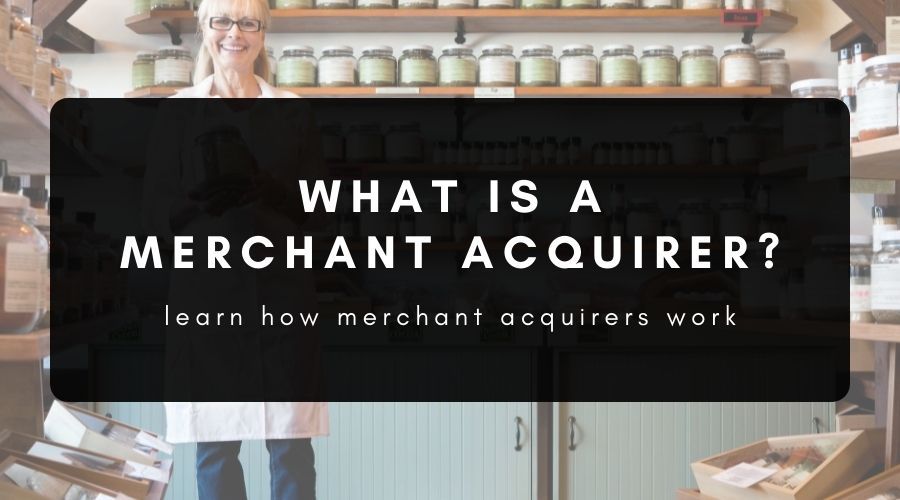
What Is a Merchant Acquirer?
A merchant acquirer is a bank or financial institution that processes card payments for merchants. Along with issuers and card associations (also called card schemes), merchant acquirers are necessary if you want to receive online payments for products.
Here, we’ll answer the question “what is a merchant acquirer?,” covering some of the financial services that an acquirer offers and how its operations fit into the card payments industry.
Merchant Acquirer
A merchant acquirer partners with companies to authorise credit card transactions. As such, the acquirer takes on the responsibility of authenticating the customer and seeking authorisation before completing a transaction and releasing the funds to the merchant’s nominated bank account.
Merchant acquirers are also responsible for handling chargebacks and refunds for the merchant. They take on the responsibility for payment if the merchant can’t repay the cost.
Issuer Bank
A card issuer or issuing bank is a financial institution that is authorised to issue debit and credit cards to consumers from the major card schemes (Visa, Mastercard and American Express). Just as the merchant acquirer acts on behalf of the merchant, the issuer acts on behalf of the customer.
Issuers can block cards that have been reported lost or stolen or initiate chargebacks in the case of fraud. Issuing banks have the responsibility to vet their clients before approving credit and assume responsibility if the client cannot repay the debt.
The Transaction Process
When a customer makes a purchase online, by phone or through a point-of-sale card terminal, the process for credit and debit card transactions is as follows:
- The customer or merchant enters payment card details into the payment gateway.
- The online payment gateway forwards these details to the acquiring bank, who forwards them to the card network, who forwards them to the card-issuing bank.
- The card-issuing bank checks whether the card is blocked or reported as lost and whether there are sufficient funds on the card to complete the transaction.
- The card issuing bank sends either “approved” or “declined” back to the card network, which sends this message back to the acquirer, and the acquirer withdraws the funds.
- The acquirer holds the funds for an agreed-upon transaction settlement period (usually 24 to 48 hours) and releases these funds to the merchant.
The Chargeback Period
Once a purchase is completed, there is a period of time in which the merchant acquirer is liable for the reversal of any card transactions made (known as a chargeback). After this period is over, the issuing bank becomes liable for an unsuccessful chargeback.
Chargebacks are often initiated when:
- The goods or services were faulty
- The wrong goods were sent
- The goods or services never arrived
- The purchase was made without the cardholder’s knowledge or consent
- The customer is trying to get goods and services without paying for them
When a chargeback occurs, the acquirer recovers the funds from the merchant and completes the refund. However, if the merchant has become insolvent between the time of the transaction and the time of the chargeback, the acquirer has to recover the amount.
That is why acquiring banks ask for so much supporting information before taking on a merchant customer—they need to make sure that they don’t lose too much money if a company can’t cover the cost of chargebacks and refunds.
Merchant Acquirer vs. Payment Processor
Rather than working directly with an acquiring bank like J.P. Morgan, e-commerce merchants typically work with a merchant service provider or payment service provider who in turn arranges the merchant account.
Understanding the relationship between merchant acquirers, merchant service providers and payment service providers can help you to better understand what a merchant acquirer is.
Merchant Service Providers
Merchant service providers equip registered businesses with an individual merchant account and merchant identification number (MIN).
In addition to handling electronic payments and providing a payment terminal for physical and e-commerce companies, merchant service providers typically offer merchant services, such as software for the tracking of sales, fraud and chargeback management solutions, enhanced security policies and 24/7 customer support.
Payment Service Providers
A payment service provider (PSP) or merchant aggregator is a third-party site that processes credit card payments, debit card payments and alternative payment methods through a single merchant account that is shared by all of its members.
The fundamental difference is that instead of requiring their members (“sub-merchants”) to have their own merchant identification number, the PSP acts as the payment facilitator and sets its own transaction fees to cover the payment costs incurred by the acquiring bank.
Finding a Merchant Acquirer for Your Business
Understanding what a merchant acquirer is can help you to find the most appropriate bank to handle transactions on behalf of your business, with the types of key contract terms that benefit your business. Small startups may find it easier to go through a payment service provider rather than signing a service agreement with a merchant acquirer.
Established businesses will need a merchant service provider and merchant identification number to prevent any limits on card transactions. In both cases, providing your goods and services reliably and working hard to prevent chargebacks will make it easier to find the right acquirer to partner with your business.

